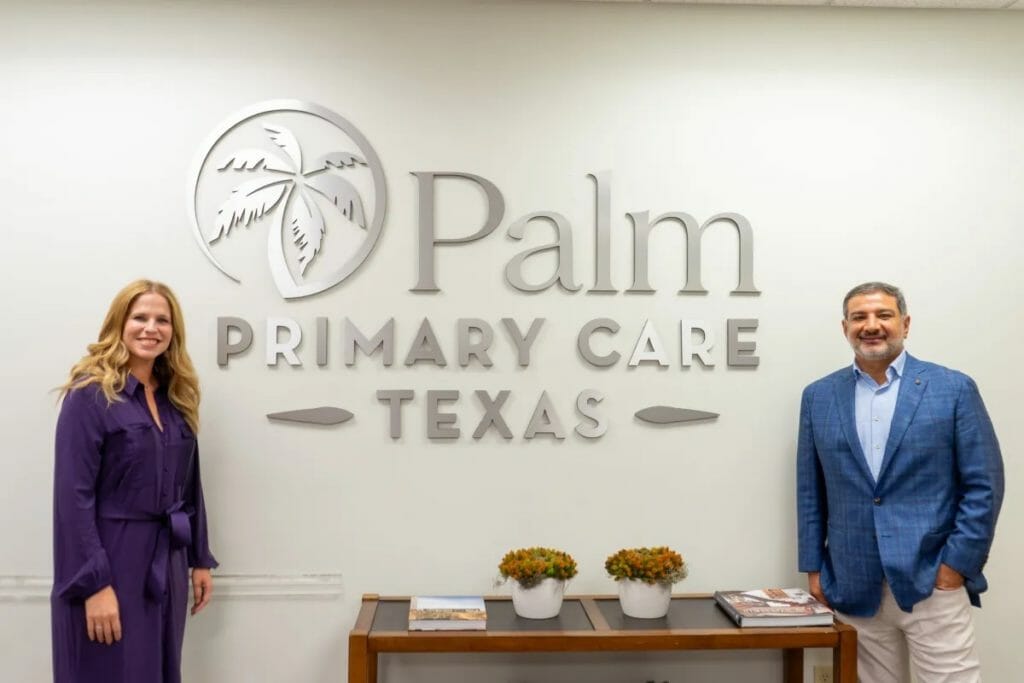
More than three years into his job as chief executive officer at Florida-based Palm Medical Centers, Fowad Choudhry remained set on one thing: He wanted to expand the primary care provider’s business model into North Texas.
To do that, the company had to answer one big question: Where exactly in North Texas?
Founded in 2013, Palm Medical Centers — which has 35 locations across Florida — offers primary care services for adults aged 65 and older who have Medicare Advantage HMO, PPO and fee-for-service insurance plans through a number of providers. In Texas, providers include Blue Cross Blue Shield, Humana, and United Healthcare.
Through its model, Palm assumes total risk for each Medicare patient. If the provider keeps its older adults healthy, it receives a yearly reimbursement from the insurance company for each patient.
If a patient is hospitalized, portions of the reimbursement are chipped away and funneled toward the emergency or urgent care visit, said Dana Tarrant, vice president of Palm’s North Texas market.
“Through the risk model, we are taking on that patient as ours,” she said. “Our goal is to see the patient regularly and stay on top of their needs to avoid hospitalizations throughout the year and retain their Medicare Advantage funds.”
Since Choudhry already lived in Fort Worth, he was familiar with the local primary care sector and felt Palm’s business model would stick in Tarrant County.
When it came time to look, Choudhry knew which locally owned clinics would be the best fit for acquisition, he said.
“I’ve worked in this community since 2000, so a part of me was always trying to find a way to come back here,” he said. “There were physicians in Fort Worth looking for opportunities. From a business side, it made a lot of sense.”
In 2022, one of the first calls Choudhry made was to Dr. Brian Byrd, the owner of Texas Family Medicine, which has been serving residents in southwest Fort Worth since 2001. The second call was to Dr. Morvarid Rezaie, who owns and leads Fort Worth Primary Care in the Fort Worth Medical District.
After several discussions, Palm acquired Texas Family Medicine and Fort Worth Primary Care in June — officially launching Palm Primary Care in North Texas. The clinics were rebranded in September.
The acquisition frees the clinics’ physicians to focus on patient needs while Palm handles the administrative aspects of the businesses.
“The clinics were running great and had lots of happy patients, but they saw room for improvement,” said Tarrant. “They’re really excited to have us come in and manage what they couldn’t independently.”
By relieving physicians of business administration duties, Palm’s oversight also allows the medical staff to spend more time with patients. Instead of seeing volumes of patients, the clinics see about 30 a day, allowing them to personalize the appointments, said Choudhry.
Palm’s expansion to Tarrant County has also gained interest from big names in the local medical scene.
In August, Palm appointed Dr. Stuart Pickell to serve as its medical director for the provider’s clinic in the Medical District. With over 20 years in Fort Worth, Pickell currently serves as president of the Tarrant County Medical Society and as an associate professor at Texas Christian University’s Burnett School of Medicine.
Since Pickell has known Choudhry for over 20 years, he was familiar with Palm’s personalized care model and knew he wanted to get involved.
“I believe in the overall concept of what they’re trying to do,” he said. “When done correctly, it is a better approach to health care delivery than what we currently have, which is very fragmented and inefficient … The future of health care ought to be more value-based care.”
Still, expanding to North Texas isn’t all smooth sailing. Palm’s clinics are struggling to get more physicians to work in primary care, Choudhry said.
Combined, the provider’s two Fort Worth clinics offer five primary care physicians and five registered nurses on staff. Together, the two clinics treat a total of 800 to 900 Fort Worth residents.
The projected job growth of physicians and surgeons nationwide from 2020 to 2030 is slower than average at 3%. And the demand for physicians is projected to increase due to the aging and growing population, according to the Bureau of Labor Statistics.
By 2034, there will be a national shortage of 37,800 to 124,000 physicians, according to a report from the Association of American Medical Colleges.
To combat the shortages, Palm is hoping to attract more physicians by letting its model speak for itself, Choudhry said.
“Some people are not coming into this field the same way that they were previously,” he said. “Reimbursement has been a big portion of that, because physicians have come in, and they haven’t gotten paid for what they do. We want to make primary care sexy again.”
For now, the primary care provider is preparing to open its North Texas headquarters and a new clinic in Tanglewood in February.
“The new clinic is going to be more of the model that we have in Florida,” Tarrant said. “We’re going to have a community.”
By the end of 2024, Palm Primary Care wants to add seven more clinics to its own portfolio and serve over 3,000 patients across North Texas.
“It’s nice having it in Fort Worth right now, because that is where we both live,” Tarrant said. “But, eventually we want to expand throughout Dallas and different areas of Texas. That would be really exciting for us to get to that point.”

 4.8 Google Rating out of 7K Reviews
4.8 Google Rating out of 7K Reviews






